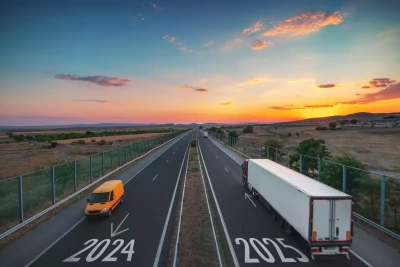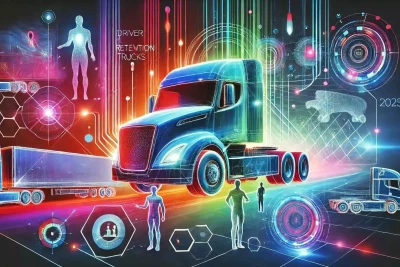Private Fleets, Driver Retention, and What’s Ahead for Freight in 2025
January 14, 2025
 The freight industry is no stranger to change, and recent years have underscored its resilience and adaptability. From the boom of pandemic-driven freight demand to recent challenges like falling rates and driver turnover, the sector continues to evolve. With 2025 shaping up to be a transitional year, experts are keeping an eye on several key trends on the road to recovery.
The freight industry is no stranger to change, and recent years have underscored its resilience and adaptability. From the boom of pandemic-driven freight demand to recent challenges like falling rates and driver turnover, the sector continues to evolve. With 2025 shaping up to be a transitional year, experts are keeping an eye on several key trends on the road to recovery.
During the height of the pandemic, freight rates soared, prompting many shippers with existing fleets to expand their operations. This knee-jerk reaction led to significant growth in private fleets as companies sought to offset high transportation costs by managing more of their logistics internally.
However, as rates began to normalize, these expanded fleets encountered challenges. Smaller private fleets often focus on optimizing driver routes and retaining talent, but scaling up introduces complexity. Larger fleets face difficulties in driver recruitment, retention, and management—issues typically seen in the for-hire sector.
“Some of those private fleets grew to a point where retaining drivers and getting new drivers started to become a bigger challenge than it was when they were a smaller private fleet,” explains American Trucking Associations Senior Economist Bob Costello.
Despite these challenges, there’s optimism that the market will see gradual improvements throughout the year. Sequential changes—month-over-month or quarter-over-quarter shifts—indicate slow but steady progress, even as the industry climbs out of a “big hole” left by the downturn.
Will 2025 be a breakthrough year for a recovery in the freight market? Find expert analysis of this and other key topics in the latest episode of the Stay In Your Lane Podcast .
Driver turnover remains a critical issue, though it has improved from historic highs. Today, the annualized turnover rate for the truckload sector hovers around 75%, a significant decrease from past levels that exceeded 100%.
To address this, fleets are investing in driver retention strategies, recognizing that losing drivers is costly. While some turnover is unavoidable due to factors like drug testing or performance concerns, most fleets are focusing on building stronger relationships with drivers and offering competitive benefits to keep talent in-house.
As demand slowly increases, a tightening driver market may lead to what’s often called the “free agency of trucking.” Skilled drivers with clean records will have ample opportunities to switch carriers, pushing fleets to prioritize retention efforts further.
In the industry at large, experts anticipate a gradual recovery throughout 2025. Freight demand is likely to pick up in Q2, with sequential improvements continuing into Q3. Meanwhile, reduction in capacity combined with modest demand growth should help stabilize rates. While 2025 is expected to be a transition year, the outlook for 2026 appears brighter, with hopes for stronger economic performance and more stable market conditions.
 “I think as we go through this year, the second quarter in general should be a little bit better than the first, third quarter should be a little bit better than the second, and by the time we get to the end of the year, hopefully, we’ll be okay,” Costello says.
“I think as we go through this year, the second quarter in general should be a little bit better than the first, third quarter should be a little bit better than the second, and by the time we get to the end of the year, hopefully, we’ll be okay,” Costello says.
The freight industry’s adaptability will continue to be its greatest strength. As private fleets navigate scaling challenges, competition from for-hire carriers, and challenges with driver retention, stakeholders must remain agile.
“It’s been frustratingly slow, but in the data, we’re seeing some improvement,” says Costello. “And I say, hang in there. I think by the time we get through the first couple of quarters, things are going to start to feel better out there.”
While the road to recovery may feel slow, the progress is undeniable. By focusing on sustainable growth and addressing workforce challenges head-on, the industry is well-positioned for a more stable future.
At Triple T Transport, we understand the challenges of the modern freight market. With a commitment to building strong relationships and delivering tailored solutions, we help shippers and carriers adapt to changing market conditions and achieve long-term success. As the industry continues to recover and evolve, count on Triple T Transport to be your trusted partner every step of the way.














